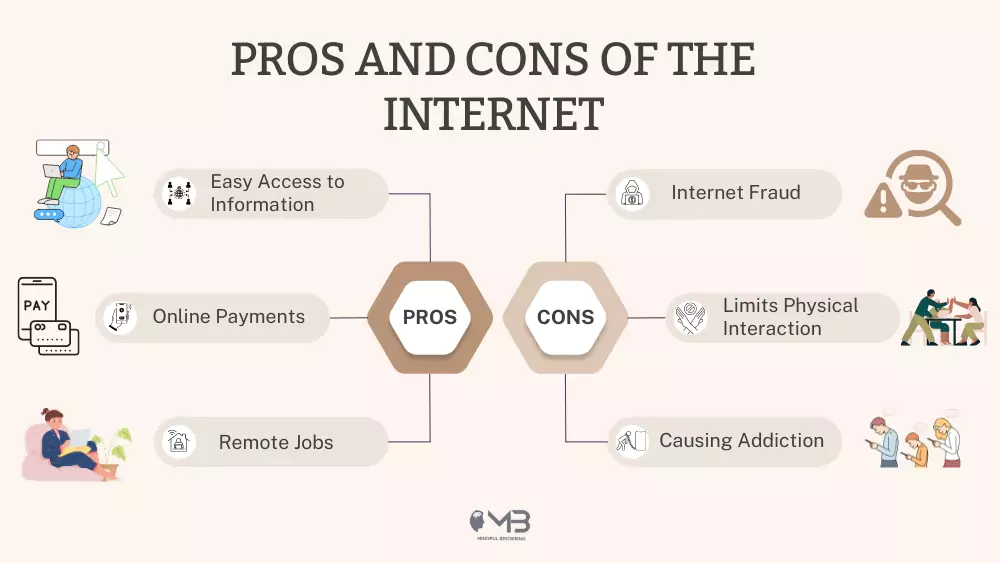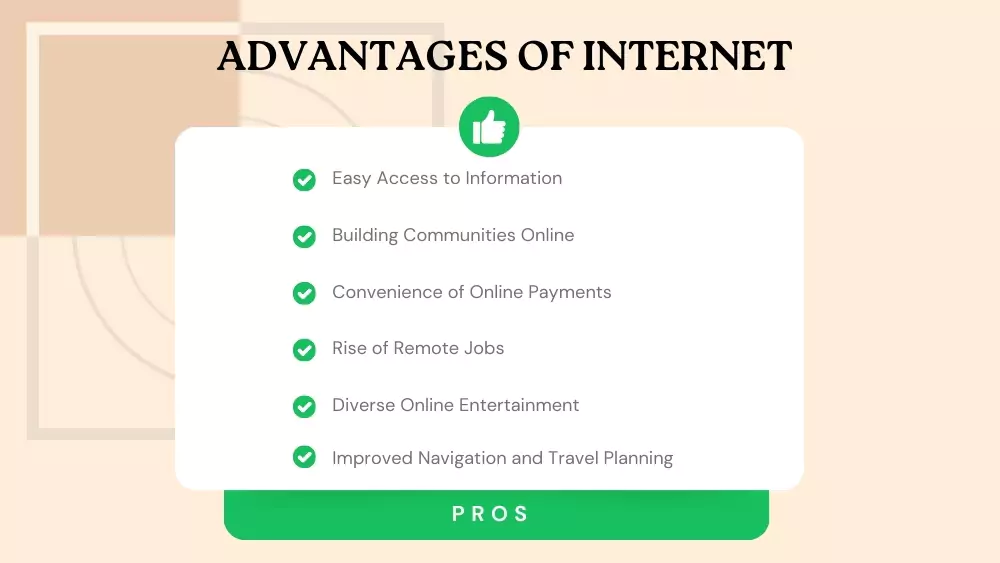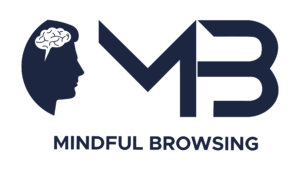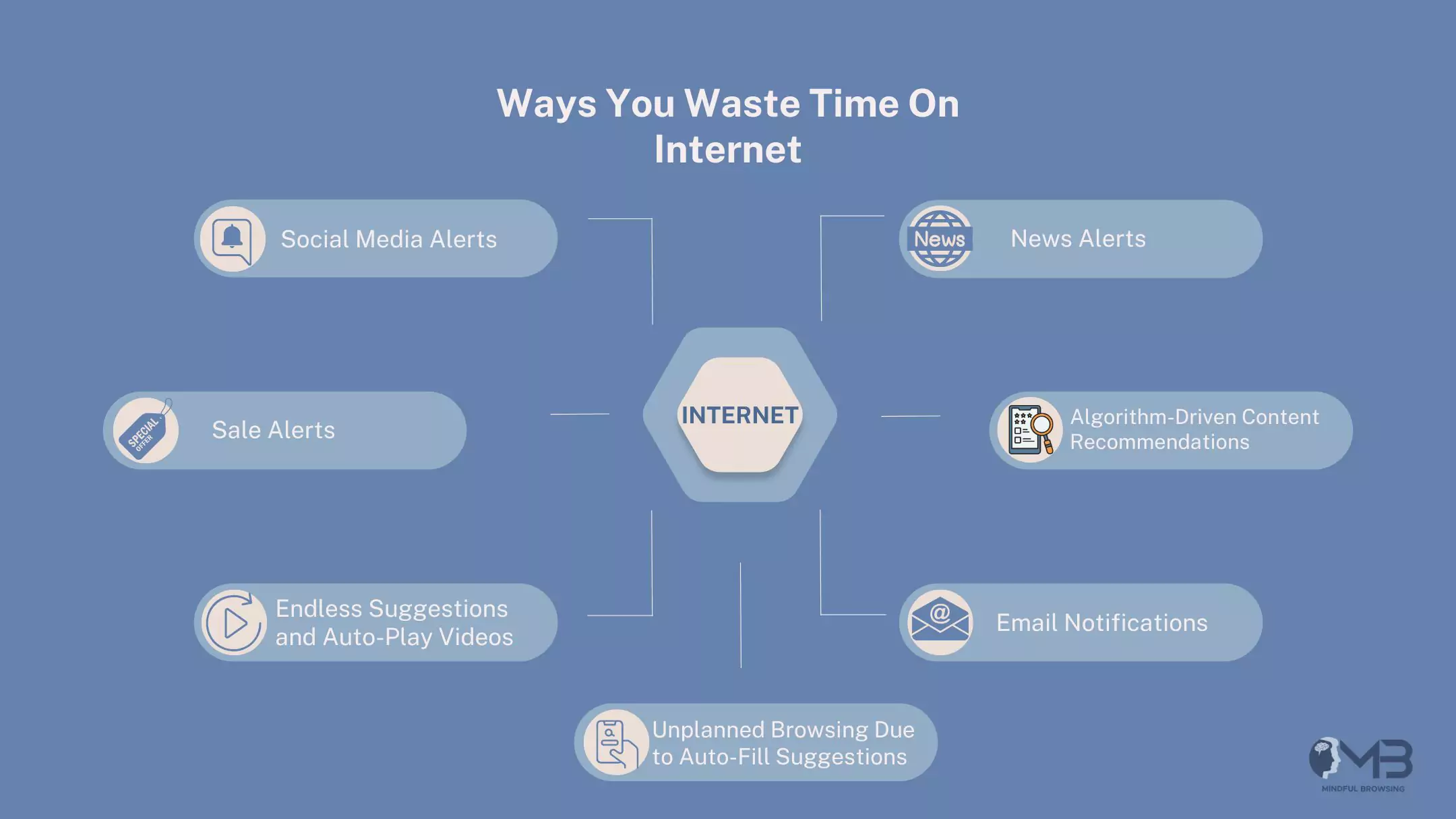
The internet deserves most of the credit for making our lives so much easier, with information literally at our fingertips. But despite its prowess, this very technology that offers the luxury of learning about everything and anything could disrupt our daily lives. We are not saying the internet is bad. Does the world need it? The general sentiment is yes; those in support would be more right than wrong. Is the Internet making the world a better place? The short answer is yes, but if put in a more nuanced perspective, it is somewhat lacking as well. This article will discuss the six pros and cons of the internet in depth.
Is the Internet Changing How We Think?
In 2008, Veteran American journalist Nicholas Carr, in an article titled “Is Google Making Us Stupid?” explained how he felt that something was reprogramming his brain for the longest time. In a more vivid expression, his exact words were, “I’m not thinking the way I used to think.”
Carr stated that he knew precisely why he felt like his brain was being reprogrammed. He was spending countless hours on the internet. We can argue whether he could have been probing things too deeply, but in all honesty, he presented a strong case.
We can’t dispute the fact that the internet has changed the way we think. But we do believe, in some cases, we are better for it. Bearing Carr’s detailed opinion in mind, let’s dive into the pros and cons of the internet.
Advantages of Internet

1. Internet Provide Easy Access to Information
It’s not a secret that the internet is perhaps the most unparalleled source of information today. We can learn a lot about history, cultures, various recipes, languages, or even advanced topics like science with just a few touches of a button.
In his article, journalist Nicholas Carr stated that technology is “godsent.” He explained how the internet has simplified research for authors, saving them the hassle of flipping an excruciating amount of pages from a library of books.
Google gives us instant answers, diverse perspectives, and up-to-date knowledge. This easy access to information empowers individuals to educate themselves and supports lifelong learning in a way that was once unimaginable.
A 2023 Pew Research Center study found that 95% of U.S. adults use the internet at least occasionally. A 2021 Pew Research Center study reported that 90% of U.S. adults said the internet was at least important during the COVID-19 pandemic, with access to information being a key benefit. Platforms like Wikipedia, with over 65 million articles, and Google Scholar provide free access to academic and general knowledge, democratizing education globally. During the COVID-19 pandemic, the World Health Organization’s online resources reached millions, delivering critical health information in real time.
2. Internet Helps in Building Communities Online
The internet is revolutionizing how we think and connect with others, and that’s because we have shared interests. The technology birthed online forums like Discord, GitHub, and Quora, educational platforms with vibrant communities where people can exchange knowledge and support each other.
For example, if you’re passionate about gaming, you can join a global community of enthusiasts who share walkthroughs, speedrun tips, or even how to play. These learning communities also go beyond geographical barriers, enabling people to learn from each other regardless of location.
3. Convenience of Online Payments
Traditional forms of payment for products and services, such as using cheques or actual money for every exchange, have become a thing of the past. Online payments have made it easier to purchase goods and services because of convenience. Online payment systems are used for shopping for food, bill payments, and many more. Crowdfunding has become more efficient, faster, and even safer than traditional methods.
With the advent of digital wallets and mobile payment apps, handling financial transactions is easier than ever, reducing the hassle and sometimes risk associated with cheques or secure physical cash transfers.
4. Rise of Remote Jobs
One of the most obvious interactive effects of the internet today is the often-celebrated increase in work-from-home employment. Employees are no longer bound with employers located in the vicinity. They can work in organizations situated anywhere on the globe. This change provides more flexible working arrangements, saves time on commuting, and is generally healthier as it helps people achieve a work/life balance.
For employers, it provides a worldwide marketplace where qualified personnel can be obtained despite geographical constraints. Flexibility as a working mode can significantly change industries and/or increase the representation of various populations in workplaces. Benefiting both employees and employers.
5. Diverse Online Entertainment
Predictably, modern culture has been inundated with entertainment choices due to the presence of the internet. Streaming services offer entertainment in movies, television programs, music, and games from various regions across the globe. Particularly, limitless content is available online to meet every individual’s distinct expectations.
Whether you want to watch a TV series on a weekend, find new bands and singers, play games, or want to make new friends, the internet provides an almost endless list of all kinds of entertainment. It is like a fun box that offers one an opportunity to try out something new and play for hours.
6. Improved Navigation and Travel Planning
The internet has fundamentally changed the way people travel around, from real-time navigation using GPS to reviews as well as travel blogs or vlogs. Browsing apps like Google Maps and TripAdvisor, finding restaurants, tourist attractions, and accommodations with user feedback means informed decisions.
Moreover, an online flight and hotel platform allows travelers to compare their prices and secure the very best deals, even up to last-minute trips. For those who love adventure, virtual guides and forums will offer tips on discovering hidden gems or traveling on a budget, ensuring every journey is well-planned and memorable.
Disadvantages of Internet

1. Risk of Internet Fraud
One of the challenges that people face on the internet is that scammers are always out there. Capitalizing on the internet’s capabilities. So many people are conned and emotionally strained on a daily basis. Phishing emails, fake websites, links, and messages that have reached the user’s inbox, as well as the fake accounts shared on social networks, can confuse even the most cautious of users.
For enhanced security, particularly on a Google Wi-Fi, you should consider a VPN. A Google wifi VPN can encrypt your connection and protect your data from potential threats.
The anonymity of the internet encourages fraudsters to take advantage of the ever-trusting human nature, with the end result being financial loss and emotional distress. Being vigilant, using strong passwords and checking sources are important steps in protecting yourself from online fraud.
2. Internet Can Cause ADHD
The effectiveness of long-term Internet use was investigated by The Ohio State University Wexner Medical Center. From the data gathered from the study, problems such as Attention Deficit Hyperactivity Disorder (ADHD) can be provoked by a constant flow of notifications and the involuntary fast-paced reading we see today.
Modern technology’s structure, embedded with frequent interruptions and an abundance of stimuli that provide immediate feedback, hinders focused work for a long period of time. This stimulated mode of operation might lead to the loss of concentration. And enhance the necessity of continuous interactions, potentially off-putting productivity and mental health.
Read Also: Mental Health Goals For a Balanced and Happier Life
3. Limits Physical Interaction
Despite the internet’s ability to bring diverse people together through a common interface, actual physical contact may be restrained. It also diminishes people’s face-to-face skills, and they may feel extremely alone when they are actually not.
Back when there was no social media, people had genuine, face-to-face communication. Now, it’s just shallow texting or comments on a social media post that change relationships and individual bonds. I post daily, but the Internet cannot replace real meetings. Therefore, balancing online interactions with physical presence is essential for maintaining healthy social relationships.
4. Causing Digital Addiction
A risky trend is the fact that people become addicted to the internet. Used applications are meant to provide endless interactions and entertainment: social networks, games, and streaming services contribute to users spending more time with gadgets. This can lead to all sorts of undesirable outcomes and can alter everything from the sleep cycle to inactivity.
5. Exposure to Adult Films and Violent
The internet allows anyone to quickly type in a search query, like ‘adult films/content’ or ‘violence in movies’. This is dangerous because children are easily exposed to “explicit” content that they can access from the random links and ads present on several websites.
Parental controls and content filters may help to stop visiting bad or dangerous websites from being accessed, but they aren’t all reliable. This is precisely because safe internet usage must be constantly monitored, and the extent to which responsibility for internet use must be discussed in its entirety.
6. Privacy and Data Security Concerns
Due to the internet, personal information is now more readily accessible, thereby heightening the risk of identity theft, data breaches, and even unlawful spying. A user, therefore, is empowered with the knowledge of how to get into cybersecurity to act proactively to protect their data. Concerns are also raised by the collection of user information that is usually done without explicit consent over the storage and use of the data.
Malware and phishing efforts also pose a threat to the security of both persons and companies. Users of public Wi-Fi networks might be at risk from hackers. To defend against these attacks, robust cybersecurity measures like two-factor authentication, VPN setup, and encrypted communication are crucial. When users fail to implement these measures, they have to bear the consequences. Employee benefit administrative firm VeriSource is an example. Last year, four million individuals lost their personal information.
For beginners wondering if cybersecurity is hard, they can start with small measures like encrypted communication or setting up a VPN, which is a great way to enhance security. For instance, you can also learn how to get a VPN on a school Chromebook to ensure safer browsing even in shared networks.
Final Thoughts
Weighing the pros and cons of the internet, it becomes clear that this digital age marvel is neither purely beneficial nor entirely harmful. The internet’s advantages highlight its profound positive impact on our lives. However, the cons of the internet underscore the challenges and risks accompanying its use. These drawbacks remind us that while the internet opens many doors, it also brings a host of potential issues that need to be managed thoughtfully.
Ultimately, as with any tool, our choices and behaviors shape the Internet’s impact. Balancing its advantages with a mindful approach to its risks is key to ensuring that it remains a force for positive change in our increasingly connected world.




